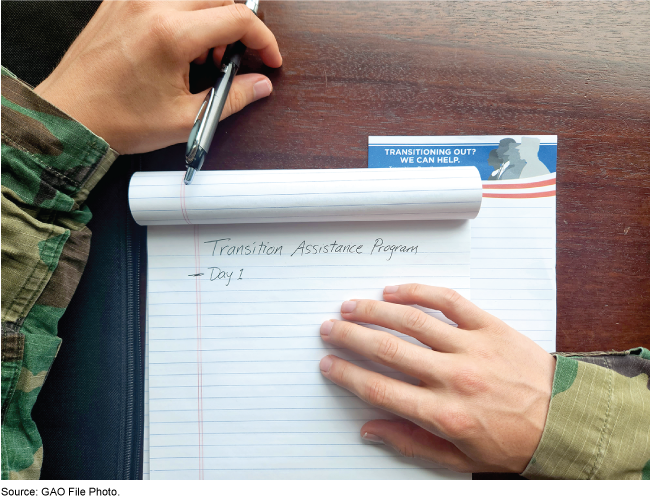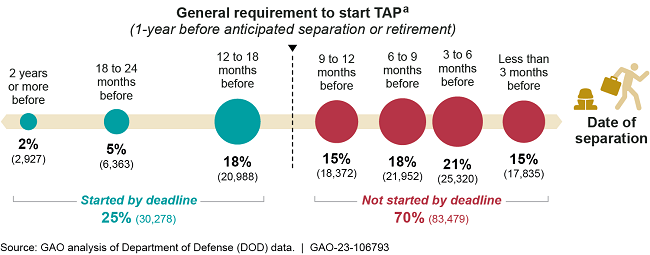Servicemembers Transitioning to Civilian Life: DOD Could Enhance the Transition Assistance Program by Better Leveraging Performance Information
Fast Facts
The Transition Assistance Program helps servicemembers choose a career, pursue higher education, or find a job after military service. The program tailors support to individuals' needs based on how prepared they are to enter civilian life.
We testified that nearly 25% of servicemembers who needed maximum support didn't attend a mandatory 2-day class. And most servicemembers didn't start the program at least 1 year before leaving service, as normally required.
DOD collects data on class attendance and the timing of participation, but we previously recommended that DOD use the data to fully inform program decisions or improve attendance.

Highlights
What GAO Found
To improve the Transition Assistance Program (TAP), federal law required the service branches to establish counseling pathways, among other actions. GAO found that DOD service branches had fully implemented the TAP counseling pathways. These pathways include a self-assessment, individualized initial counseling, tier assignment that reflects servicemembers' transition preparedness, and a revised core curriculum. Service branch officials, TAP staff, and servicemembers GAO interviewed from selected installations generally expressed positive feedback on the TAP counseling pathways.
Over 90 percent of transitioning servicemembers participated in the TAP counseling pathways, according to GAO's analysis of TAP data from April 1, 2021 to March 31, 2022. Although participation increased in 2-day tailored classes on issues like higher education or vocational training, the service branches waived many servicemembers from attending them. Per service branch policies, servicemembers who need maximum transition support must attend a 2-day class, but GAO found that nearly a quarter of them did not. GAO also found that most servicemembers (70 percent) did not start TAP at least 1 year in advance, as generally required.
The service branches and the TAP policy office collect and review performance information on 2-day class attendance and timeliness. However, they do not fully leverage this information to understand and improve results, inconsistent with leading practices for using performance information. For example, DOD does not use data it collects on servicemembers who start TAP less than 1 year in advance, including why they started late. Better understanding root causes would help DOD officials to craft and implement effective corrective action plans and improve servicemembers' ability to benefit from the full range of transition resources available to them.
Time Frames for Starting the Transition Assistance Program (TAP) for DOD Active-Duty Servicemembers Who Left the Military from April 1, 2021 through March 31, 2022 
Note: For the remaining servicemembers, the timing of when the servicemember started TAP was unknown due to missing data or not applicable because the servicemember separated under short notice. The 1-year time frame does not apply when servicemembers face an unanticipated separation or retirement. Therefore, in some cases the requirement may have been met although the servicemember started TAP less than 1 year before separation or retirement.
Why GAO Did This Study
More than half a million servicemembers are expected to participate in TAP over the next few years. TAP is a mandatory program designed to assist separating servicemembers who may face challenges in choosing a career path, finding employment, or deciding which college to attend. The program was recently tailored to meet individual servicemember needs by assigning them to counseling pathways based on how prepared they are to transition back to civilian life.
This testimony summarizes GAO's December 2022 report on the TAP program, including GAO's findings on the implementation of TAP counseling pathways and transitioning servicemembers' participation in these pathways.
For that report, GAO reviewed relevant federal laws, policies, and agency documents and interviewed officials from relevant federal agencies, service branches, and five installations. The installations were selected for diversity in numbers served, location, and service branch. In addition, GAO analyzed the most recent available TAP data, and determined they were sufficiently reliable for active-duty members of the DOD service branches but not DOD reserve component or Coast Guard servicemembers.
Recommendations
In its December 2022 report, GAO made eight recommendations—that the service branches and DOD TAP policy office more fully leverage the performance information they collect to develop and implement plans to improve: (1) 2-day class attendance and (2) TAP timeliness. DOD agreed with the recommendations.
